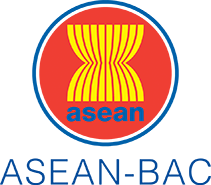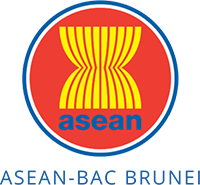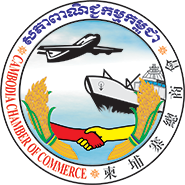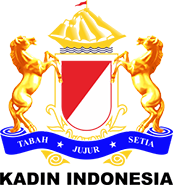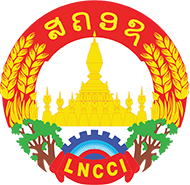summary
December 15th 2020
3rd Webinar Upgrading Healthcare Quality in ASEAN with Digitalization
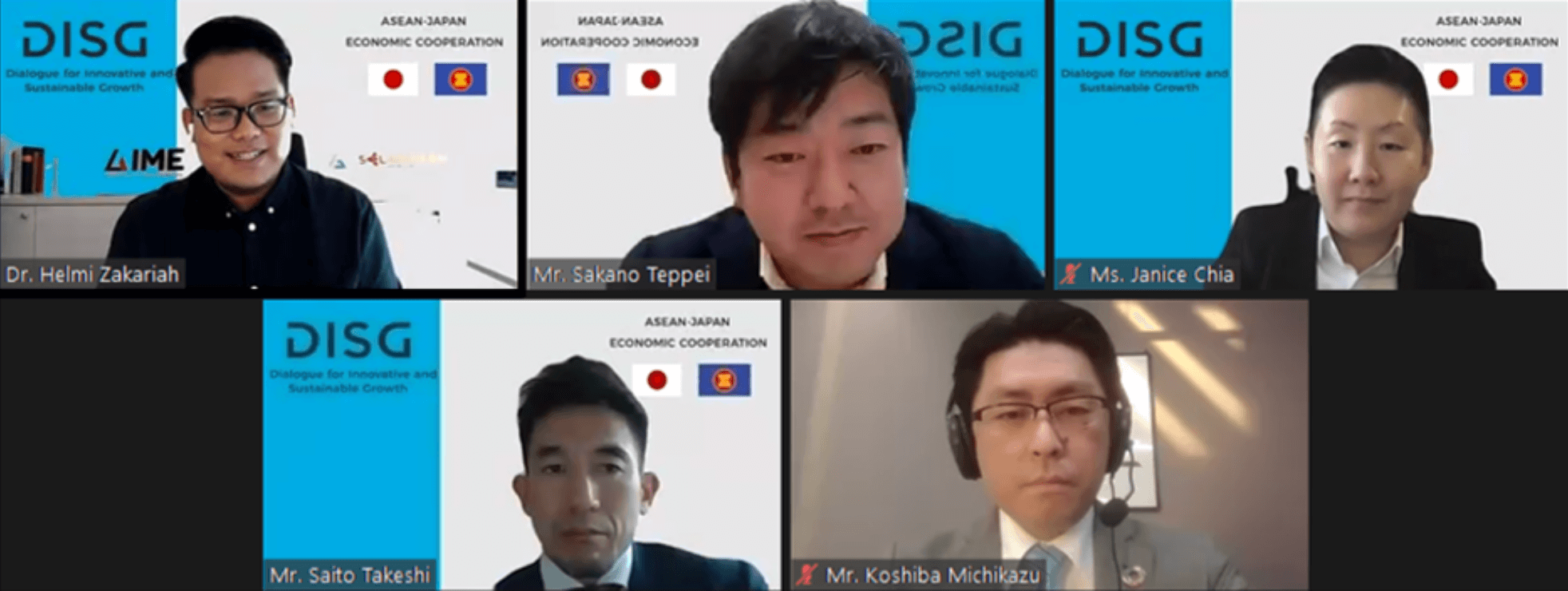
Agenda
1. Opening remarks from the ASEAN Socio-Cultural Community.
2. Keynote speech from Ministry of Economy, Trade, and Industry (METI), Japan.
3. Panel discussion between Ageing Asia, Allm Inc., IHH Healthcare, and Mitsubishi UFJ Research & Consulting
Speaker
-
H.E. Kung Phoak
Deputy Secretary-General of ASEAN for ASEAN Socio-Cultural Community -
Mr. Inamura Takuma
Director, the Healthcare Industries Division, Ministry of Economy Trade and Industry (METI), Japan -
Ms. Janice Chia
Founder and Managing Director, Ageing Asia -
Mr. Sakano Teppei
CEO, Allm Inc. -
Mr. Saito Takeshi
Board Member, IHH Healthcare
Moderator
-
Dr. Helmi Zakariah
Digital Health Advisor to Selangor State Government of Malaysia -
Mr. Koshiba Michikazu
Head, Center on Global Health Architecture, Mitsubishi UFJ Research & Consulting Co Ltd
Webinar Summary
This webinar was held as the 3rd series of Webinar, a part of the “Dialogue for Innovative and Sustainable Growth (DISG)”, endorsed by ASEAN and Japan Economic Ministers at the AEM-METI Meeting on August 28th 2020. In this webinar entitled “Upgrading Healthcare Quality in ASEAN with Digitalization”, key figures from ASEAN and Japan shared their strategies and activities as well as the importance of accelerating open innovation. Furthermore, they discussed what benefits would be brought to relevant players and how to apply various innovative projects in our society, and what ASEAN can expect from Japan and how Japan should respond to it, and vice versa.
(Opening Remarks)
H.E. Kung Phoak explained the long-standing relationship between ASEAN and Japan to be productive with mutual benefits in the public health sector. As COVID-19 pandemic effects social and economic life alike and puts up a great challenge for health systems, H.E. Kung Phoak provided examples of ASEAN community’s health projects to counter the pandemic and improve healthcare system. As digitalization became the new normal, healthcare practitioners in ASEAN began to digitalize the sector such as using telemedicine and application.
H.E. Kung Phoak also pointed out that the pandemic required international collaboration thus ASEAN Coordination Council Working Group for Public Health Emergency was created in response to COVID-19. Support from Japan will improves overall efficiency allowing ASEAN and Japan to achieve mutual goals and thrive further.
(Keynote Speech)
Mr. Inamura Takuma pointed out the key issues in the aging population and potential solutions, creating opportunities for the future. Undeniably, the world’s aging population is steadily increasing. As a country with the highest life expectancy and number in the aging population, Japan is pioneering business innovations in elderly care and creating more opportunities in long-term care.
(Panel Discussion)
At first, all of 3 panelists, Ms. Janice Chia from Ageing Asia, Mr. Saito Takeshi from IHH Healthcare and Mr. Sakano Teppei from Allm Inc., introduced their activities briefly followed by discussion on below three topics.
The 1st topic was “Sharing the current situation and pain points of ASEAN health care sectors”. Mr. Saito pointed out that current challenge in ASEAN healthcare is the lack of quantity and quality of care, and it would shift towards the lack of transparency of convenience in the coming years. Ms. Chia explained that healthcare will become more decentralized and technological-advanced such as telemedicine and care robots.
The 2nd topic was “Accelerating inclusive digital transformation in the field of healthcare and medicine”. Ms. Chia said that virtual care will play a major role in the acceleration. Mr. Sakano and Mr. Saito added that ASEAN can look to Japanese medical system and integrated solutions in healthcare sector and Japan’s digitalization capabilities. Mr. Saito also said that ASEAN has strong countries which should help the region’s healthcare sector improve through cross-border treatments. Lastly, Mr. Sakano mentioned Japanese institutions’ contribution to the ASEAN healthcare sector through online channels and his expectation on international collaboration platform to share knowledge, data, and resources.
The 3rd topic was “Enhancing ASEAN-Japan economic cooperation in the field of medical and healthcare”. Mr. Sakano and Mr. Saito agreed that regulatory processes are always challenge. In addition, Mr. Sakano shared his challenge on finding business partner in the region and Mr. Saito pointed out the importance of cross-border data exchange platform. Ms. Chia added that ASEAN should look to Japan on how to make the healthcare sector more lucrative to draw more workers. Finally, Mr. Koshiba shared his view on the ways ASEAN and Japan can potentially work together to improve the healthcare sector from more holistic perspective including basic digital infrastructure enhancement, innovative financing scheme, collaboration with smart city initiatives and more.
Lastly, for the closing remark, the panelists agreed that ASEAN-Japan economic cooperation will be vital in moving towards the future and digitalization of healthcare.
Opening Remarks
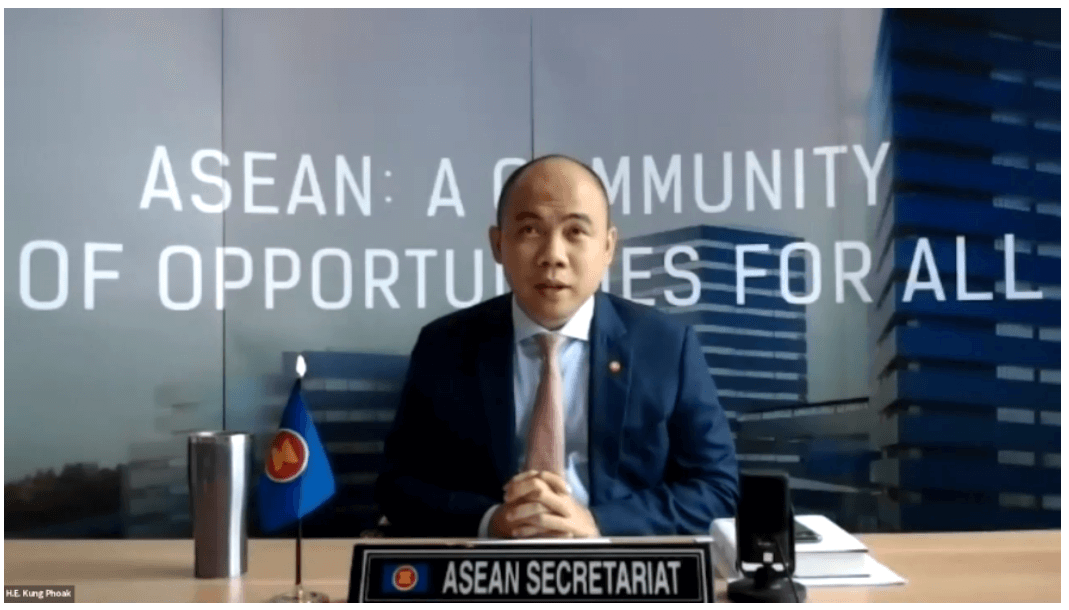
H.E. Mr. Kung Phoak Deputy Secretary-General of ASEAN for ASEAN Socio-Cultural Community, provided examples of ASEAN community’s health projects and introduced ASEAN Coordination Council Working Group for Public Health Emergency as one of international collaboration.
The collaboration in the public health sector between the ASEAN community and Japan has been and continues to be long-standing, productive, and dynamic. The COVID-19 pandemic has brought many health systems on their knees and upended many social and economic development goals. The ASEAN member states are highly committed to providing health services to all their people through universal health coverage. They also continue to develop their healthcare systems through innovation and digitalization of the systems, allowing the practitioners to provide affordable, high-quality health services. The ASEAN post-2015 health development agenda envisioned a healthy, caring, sustainable ASEAN communities by a collaborative effort to enable access to universal essential healthcare services and medical products and to develop a resilient healthcare system. These will be made possible with work programs, capacity building, knowledge and information sharing, and policies, guidelines, and tool development, among others. A few examples of the ASEAN communities’ efforts are: A web-based customized analytic tool for risk assessment, The Arch Project supported by JICA, The ASEAN Centre for Active Ageing and Innovation, and using ICT in healthcare. In addition, there is the project aims to localize the SDGs initiative on ICT for health in Cambodia, Laos PD, and Vietnam and to establish the foundation for digital primary healthcare in remote and underserved areas. The WHO digital health atlas will be used to assess the epidemiology disease patterns and health risks of subject areas. These ASEAN-wide engagements have been on top of the health sector’s continued regional health response to enable the national health system to address the evolving outbreak through technical, material, and resource support, knowledge sharing, and enhanced cooperation. Another achievement in the COVID-19 response is the establishment of the ASEAN centre for public health emergencies and emerging diseases, which is considered as an ASEAN Disease Control and Prevention (CDC). With the help of the Japanese government in many phases of the initiative, the centre will be a go-to point to fully coordinate measures and preparedness, prevention, detection, and response to public health threats. ASEAN is committed to emerging stronger from this crisis, the region invested in a comprehensive recovery plan that identified and addressed existing vulnerabilities and seizes the opportunity to bounce back better. This framework’s main objective is to be a reference for various sectoral bodies to coordinate and to contribute to the region’s recovery efforts with the goal of building a more resilient, inclusive, and sustainable recovery in line with the ASEAN vision for 2025 and beyond.
Keynote Speech
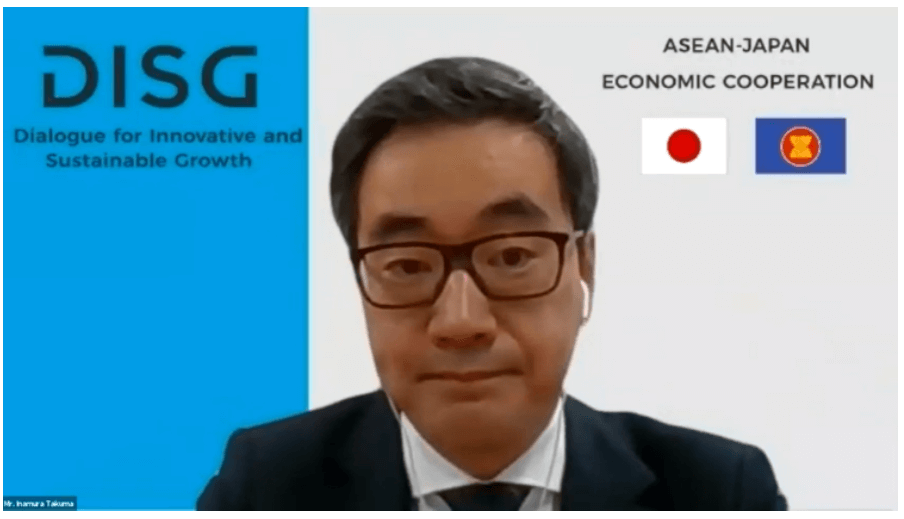
Mr. Inamura Takuma, Director, Healthcare Industries Division, Ministry of Economy Trade and Industry (METI), Japan, provided his insights on the importance of healthy life expectancy and how challenges can drive innovation.
Importance of Healthy Life Expectancy
Japan has the world’s highest life expectancy and the second-best country in the world in terms of healthy life expectancy. Healthy life expectancy is important in making the national economy sustainable. If we considered a person over 65 years old to be elderly, in 2017, 2.1 working people were supporting 1 elderly. That number will become 1.5 in 2040. However, if we consider 75 years old to be the cut-off age instead, in 2017, 5.1 working people were supporting one elderly and it will become 3.3 in 2040. This will alleviate constrain for younger generations to support the elderly. It is difficult to convince people to work for longer but Japan has proved that is possible. Despite the decrease in population, Japan’s working population was increasing due to longer worker age from 2008 to 2018.
European countries and Asian countries are or will be facing the same aging trajectory as Japan. Thus, a model to solve the aging population issues has to be established in the upcoming 10 to 20 years.
Pioneering Solutions Through Challenges
Dementia is one of the examples for the aging society issues. Currently, Japan is the country with the highest percentage of people with Dementia at 4% of the total population or about 5 million people. Although this might seems like a disadvantage for Japan but due to the Japanese tradition of social cohesion and respect for the elderly, and sophisticated companies alert to business opportunities in aging societies, help provide good services for dealing with dementia such as using robotic support.
As a result, Japan is working on a national strategy to assist this industry growth such as exporting Japanese-style medical service and supporting medical practitioner development in countries around the world. One example is Indonesia Endoscopy Training Centre which was established to train local medical practitioners.
Furthermore, METI dispatched Public-Private Joint Mission (PPM) to various countries especially in ASEAN; including Myanmar, Thailand, Vietnam, Indonesia, and the Philippines to create synergy between the Japanese medical system and the partner country’s own system.
The Japanese government has also launched a new healthcare initiative for Asian Countries called Asia Health and Wellbeing Initiative (AHWIN). Based on that, Japan has signed a Memorandum of Cooperation (MOC) in healthcare sector with several Asian countries. This collaboration is key to develop the Japanese healthcare sector and to achieve mutual benefits between countries.
Panel Discussion
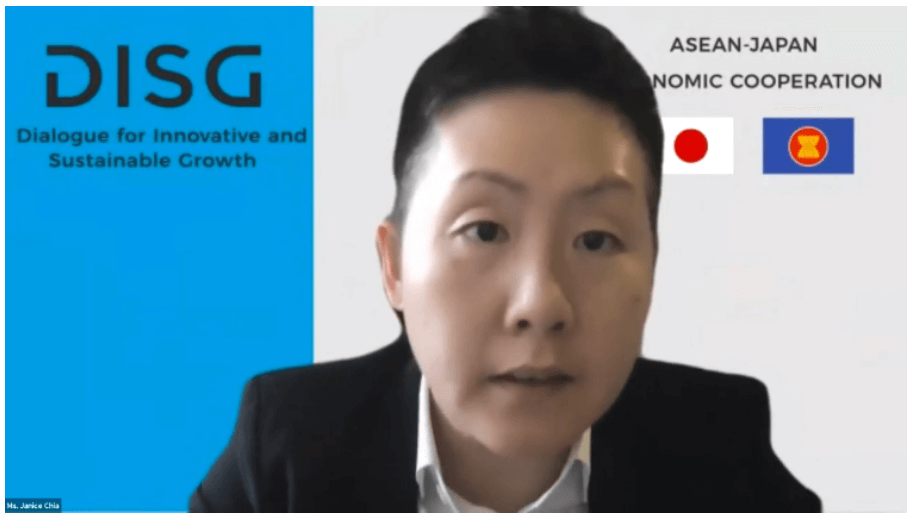
Ms. Janice Chia, Founder and Managing Director, Ageing Asia, introduced Ageing Asia and its vision and future opportunities in aging societies.
What is Ageing Asia
Ageing Asia is the first company focusing on the business of aging that sees aging as an opportunity to bring together the business, the government, non-profit organizations, and mainstream media to present positive image of business of aging. Ageing Asia also creates partnerships and curates solutions, looking at new opportunities and market demand for new products and services for the rising and changing generation of baby boomers that has been driving the world’s economy. Ageing Asia connects elder care operators to the world’s best products and services that will change the future of aging. Ageing Asia has been around for 11 years covering over 68 countries.
Vision and Future Opportunities
Ageing Asia is looking at a new way of elderly care can be implemented. In Asia, people always believe in looking after the elders as they age but Ageing Asia wants to change that. Instead of having the family looking after them in their own home, Ageing Asia wants to enable the elderly to age independently in good health and able to access the right services for them. Ideally, elderly people should not all be in a senior residential care facility but for them to age at home with technology, products, and services to support them to age longer at home independently to allows them to age with purpose.
In the current ecosystem, the baby boomers, those who were born from 1944 to 1964, will drive the new aging economy which valued at $4.56 trillion according to Ageing Asia’s latest report which is a compilation of market observation for 2020 to 2025 that shows market opportunity available in different countries as well.
Moving towards 2025, a lot of healthcare trends will emerge, one of the most important and a clear highlight is dementia, which will be a rising challenge but can also be considered as an opportunity for business to provide solutions through improving care and living quality as well. Early diagnosis means early awareness and that will allow businesses to put early products and services to support them as they age.
As a result of COVID-19, virtual care is growing fast where many older people now know how to use Zoom and other technology that set the stage for new technologies to be utilize and embrace.
Another highlight trend is the business of loneliness among the elderly, despite many people talks about healthcare and treatment, the social side and enabling elderly people to remain connected to their community is also crucial. We have to look into finding solutions for this upcoming issue since loneliness affects all ages, social hierarchy, and the pandemic clearly emphasized this issue.
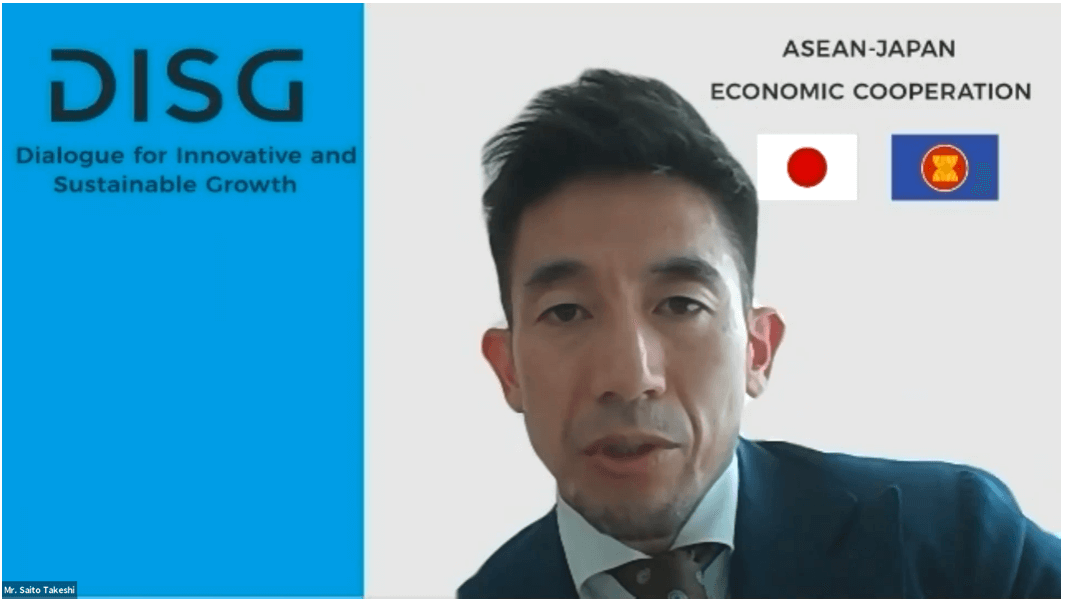
Mr. Saito Takeshi, Board Member IHH Healthcare, introduced MHM Healthcare and its subsidiary in aiming to build a value-based healthcare ecosystem
What is MHM Healthcare
MBK Healthcare Management (MHM) is a subsidiary of Mitsui & Co. Ltd (Japan). Historically, MHM has been strategically investing in the healthcare sector. Some of the investments made by MHM Healthcare are;
-
IHH Healthcare Berhad
- A network of 77 hospitals worldwide
- Grew three times in the last three years
-
Davita Care
- A dialysis service provider in the Asian region -
GOQii Life
- A tech company aims to combine healthcare and well-being -
CMH Healthcare Fund
- An investment fund to explore modern technology in healthcare -
PHC Holdings
- Insulin glucose monitoring sensor
- Medicom, a clinic management system in Japan
- Diagnostic business
- Recently became famous for its refrigerator technology to house the COVID-19 vaccines - LSI Medience Corporation, PHC Group
- Epredia
Building a Value-Based Healthcare Ecosystem
MHM Healthcare aims to build the largest value-based healthcare ecosystem that transforms quality care. MHM also aims to create a data platform within the Asian region that will help enable the value-based healthcare ecosystem. Through digitalization, IHH Healthcare will become more patient-centric.
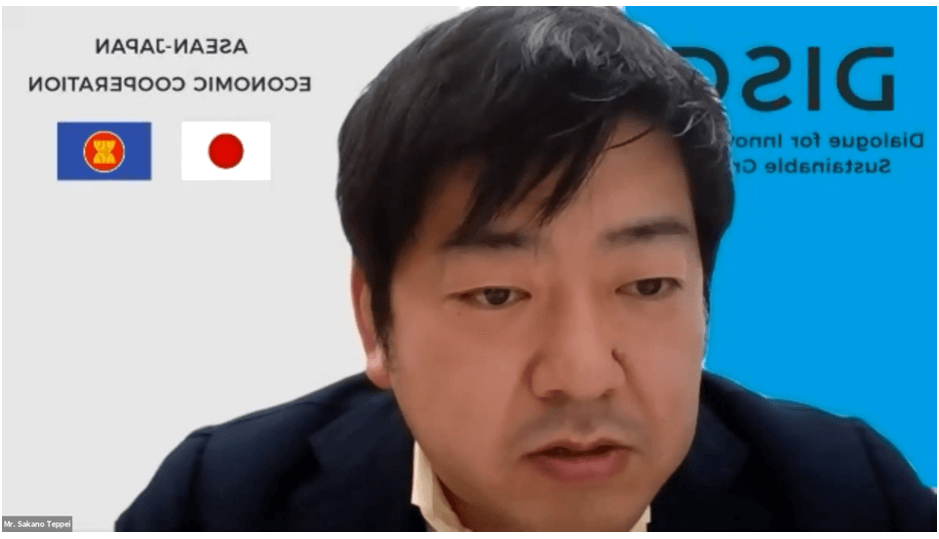
Mr. Sakano Teppei, CEO of Allm Inc., presented a new telemedicine platform and gave us a glimpse of how the healthcare industry will look like in the future.
What is Allm Inc.
Allm Inc. provides a medical ICT platform to fight against acute diseases in the form of a smartphone application, which connects to emergency doctors and specialists. The app includes various form of messaging function and medical data viewer covering any medical records of the patient.
The concept is to have medical doctors connected to patients’ medical data anytime and anywhere at very low-cost with using the existing smartphone and cloud system.
Telemedicine network can be inter-hospital, regional, and international. The app has been approved in Japan, USA, Europe and Brazil. It is the first app approved by the public insurance system of Japan, allowing for easy reimbursement for patients. Allm Inc. has expanded to 22 countries and connected with 800 institutions, forming a network of over 30,000 specialists that focus on developing countries where medical resources are limited. This year, with support from METI, JETRO, and MIC, Allm Inc. is rapidly expanding into ASEAN and able to provide specialist training such as Laparoscopic surgery, Cardiovascular surgery, Endoscopic surgery, and COVID-19 related training and telemedicine operation.
A Glimpse into the Healthcare Industry Future
Furthermore, Allm Inc. is involved in a Smart Health City project in collaboration between JETRO and Sunway combining with other medical ICT products covering a wide range of treatments from health management to emergency care. Medical ICT can directly contribute to COVID-19 pandemic relief and over 5,000 doctors are providing telemedicine through the platform with capability to discuss the case over a shared medical data such as CT scans. The idea is to become doctors hub for telemedicine to support a network of countries, in case there is a difficult case or training support required. The telemedicine network will be readily available for support 24/7. Due to the fight against the COVID-19 pandemic, Japanese hospitals are already connected to provide the type of support mentioned before with video feed in operation rooms and many more. With these existing tools and networks, medical practitioners in ASEAN can learn from the procedure that is happening in Japan very easily. The same can also be said for operation rooms in ASEAN, once connected to the network, Japanese specialists will be able to tune in and provide instant support to their ASEAN counterparts.
Additionally, to support diagnosis processes, Allm Inc. provided over 20 specialized medical AIs ranging from stroke, dementia, even COVID-19. Allm Inc. aims to create new AIs which could help diagnose diseases and virus that we are now facing.
1st topic: Sharing the current situation and pain points of ASEAN health care sectors

Dr. Helmi Zakariah (left top), Digital Health Advisor to Selangor State Government of Malaysia, moderates 1st and 3rd topic of panel discussion.
Mr. Koshiba Michikazu (right bottom), Head, Center on Global Health Architecture, Mitsubishi UFJ Research & Consulting Co Ltd, moderates 2nd topic of panel discussion.
ASEAN Healthcare Challenge
Mr. Saito:
It would be the lack of quantity and quality of healthcare. But in the coming years, it would shift towards the lack of transparency and convenience. Healthcare is one of the few markets where the customer do not know what their choices (in treatment) they have, how much it will cost, how long it will take, and even the outcome of the treatment itself. Healthcare will have to change to a value-based service rather than a quantity-based service.
Perspective on the future healthcare landscape of aging society in the Asian region
Ms. Chia:
Healthcare will become more decentralized with the growth of new hospitals and smaller communities. Older people will be able to be within one kilometer of all the services they required. The COVID-19 pandemic also contributes to the emergence of smaller communities to help facilitates the delivery of healthcare services. Additionally, virtual care delivery like telemedical services or delivery of medicine will become more prominent especially for people with chronic diseases, allowing them to self-manage. Care technologies will be growing as well, particularly assistive operational and companion robotic technology to help to support the people as they age. The main challenges here will be for the people to understand that these technologies will not replace human connections but to help support them. One positive benefit of the COVID-19 pandemic is the rapid acceleration of digital adoption which will help drive the growth of all the technologies mentioned above and more.
2nd topic: Accelerating inclusive digital transformation in the field of healthcare and medicine
The latest trends and best practices for digital transformation in healthcare industries in the ASEAN region
Ms. Chia:
We are looking more and more incorporation of virtual care technologies such as robotics in all aspect of healthcare including infectious disease management. There has been growth in robots with cleaning service capability. Another major focus is the care support service for aging at home in particular the aging baby boomer's generation, as many elderlies will require technology that allows them to live independently with healthy life. There could be more opportunities and possibilities.
Strong selling points of Japanese businesses in collaborating with the healthcare providers and business partners in the ASEAN region
Mr. Sakano:
ASEAN societies will become aging societies soon and with that diseases like dementia, cardiovascular disease, and neural diseases will follow. The medical system that is required to deal with these diseases will become increasingly complex, the Japanese system has been tried and tested so Japan can provide integrated solutions for the problems ASEAN will be facing.
Mr. Saito:
Technology and healthcare in Japan are strong. The healthcare cost per GDP is also the lowest in developed countries which means the outcome of Japanese healthcare is very strong backed by technology support. Going forward, the digitalization capability of Japan can also be an extraordinarily strong contribution to the ASEAN communities.
ASEAN strong point in deploying healthcare businesses contributing to SDG with digital technology comparing to other regions
Mr. Saito:
ASEAN is unique in the sense that it has a few very strong countries in terms of healthcare quality. The proximity of each country is also unique which allows cross-border treatments. The COVID-19 pandemic helps in accelerating telemedicine capabilities but digitalization will strengthen the cross-border treatments across the region and help fill the gaps in both quality and quantity of healthcare. Digitalization will increase transparency and can improve healthcare efficiency as well.
Future vision of creative solutions to ASEAN healthcare
Mr. Sakano:
Japanese hospitals, universities, and government agencies continue to provide support to train medical doctors to become specialists and real-time clinical support from Japanese specialists to improve healthcare quality in the region even under COVID-19 situation through online. With what is going on with COVID-19, knowledge, data, and resources need to be combined to tackle this type of issue. Ideally, an international collaboration platform can be developed to share those knowledge, data, and resources.
3rd topic: Enhancing ASEAN-Japan economic cooperation in the field of medical and healthcare
Creating a business-friendly environment in ASEAN and Japan cooperation
Mr. Sakano:
The constant challenge when a business comes to a new market is the FDA approval process. An ASEAN-integrated process for all member states for clinical processes and regulatory processes will help reduce a lot of time and effort. Another issue is to find the right partner and hiring the right people, both of which have always been challenge.
Synergies between the government and private sectors to help accelerate healthcare innovation
Mr. Saito:
Regulatory processes are always a challenge. Another thing is creating a cross-border data exchanging platform to facilitate outcome-based healthcare. In addition, Japanese manufacturers, while having great technologies, lack the supporting team required in the region. In the healthcare business, time is crucial, and delays in support cannot be afforded.
Ms. Chia:
The opportunities to distribute the healthcare products and technologies especially long-term care technologies will need to be established. The employee recruitment and training of healthcare practitioners in which ASEAN can look to Japan to make it a more attractive profession for people to enter. Another thing ASEAN can learn from Japan is the employment of older people in healthcare to promote preventive healthcare in aging societies.
Potential further collaboration between ASEAN and Japan in healthcare
Mr. Koshiba:
There is potentials for collaboration between ASEAN and Japan as follows;
To improve and invest in basic digital environment (power supply, ICT infrastructure, data centers etc.) in ASEAN including introducing innovative financing mechanism
To collaborate on new guidelines for innovative digital solutions for ASEAN countries
To create and invest in new use cases like some of the case mentioned during this webinar
To digitalize healthcare in new types of communities, i.e. smart country or smart city
Final remarks and expectation
Ms. Chia:
We are looking at the age of collaboration, we must create more networking opportunities between entrepreneurs in the sector and government leaders on new products and services.
Mr. Saito:
The collaboration between ASEAN and Japan within the field of digitalization of healthcare will be vital.
Mr. Sakano:
To take advantage of the innovative technologies that are being rolled out and to create a collaborative platform and a business relationship between countries for a fruitful outcome.



